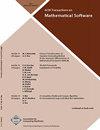算法1035:基于梯度的多面体主动集算法的实现
IF 3.2
1区 数学
Q2 COMPUTER SCIENCE, SOFTWARE ENGINEERING
引用次数: 2
摘要
多面体主动集算法(PASA)设计用于优化多面体上的一般非线性函数。该算法的第一阶段是非单调梯度投影算法,而第二阶段是探索约束多面体面的主动集算法。提出了一种基于梯度的实现,其中在第二阶段采用了共轭梯度算法的投影版本。渐进地,只执行第二阶段。使用CUTEst中的多面体约束问题和Maros/Meszaros二次规划测试集的IPOPT进行了比较。本文章由计算机程序翻译,如有差异,请以英文原文为准。
Algorithm 1035: A Gradient-based Implementation of the Polyhedral Active Set Algorithm
The Polyhedral Active Set Algorithm (PASA) is designed to optimize a general nonlinear function over a polyhedron. Phase one of the algorithm is a nonmonotone gradient projection algorithm, while phase two is an active set algorithm that explores faces of the constraint polyhedron. A gradient-based implementation is presented, where a projected version of the conjugate gradient algorithm is employed in phase two. Asymptotically, only phase two is performed. Comparisons are given with IPOPT using polyhedral-constrained problems from CUTEst and the Maros/Meszaros quadratic programming test set.
求助全文
通过发布文献求助,成功后即可免费获取论文全文。
去求助
来源期刊

ACM Transactions on Mathematical Software
工程技术-计算机:软件工程
CiteScore
5.00
自引率
3.70%
发文量
50
审稿时长
>12 weeks
期刊介绍:
As a scientific journal, ACM Transactions on Mathematical Software (TOMS) documents the theoretical underpinnings of numeric, symbolic, algebraic, and geometric computing applications. It focuses on analysis and construction of algorithms and programs, and the interaction of programs and architecture. Algorithms documented in TOMS are available as the Collected Algorithms of the ACM at calgo.acm.org.
 求助内容:
求助内容: 应助结果提醒方式:
应助结果提醒方式:


